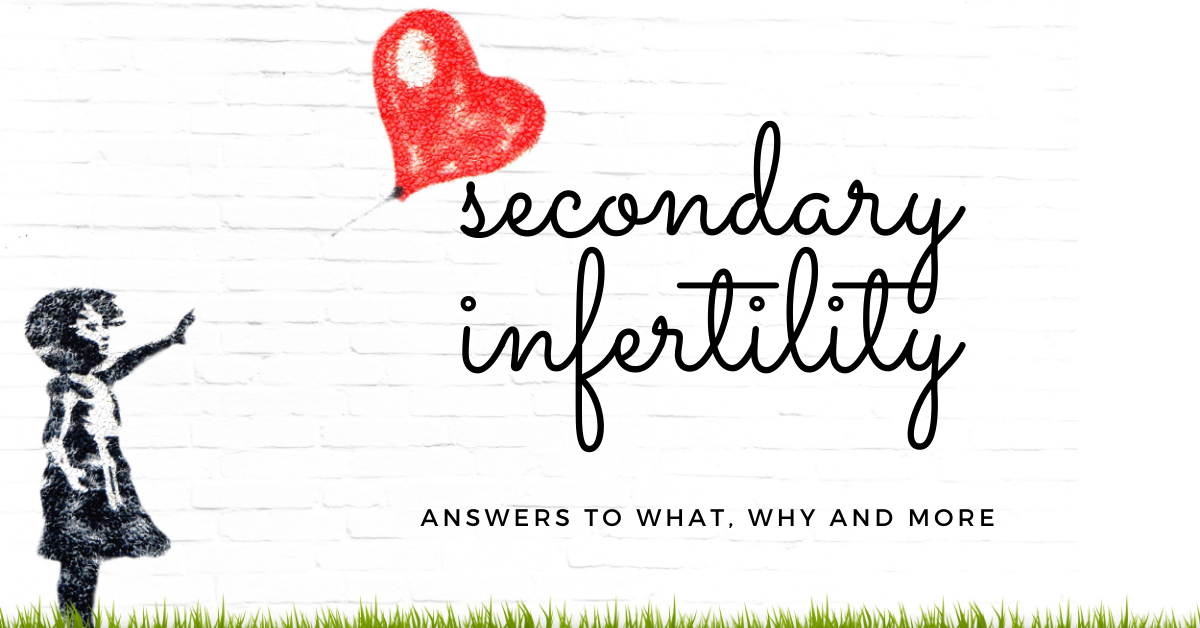Are you second-guessing yourself if you are infertile? Are you experiencing difficulty with conceiving for a second child? Were you able to conceive easily on your first child, however now that you are ready for another baby, you discovered that it was not as easy as you thought it would? Have you been trying and waiting for years?
When my son turned two, my husband and I decided it’s time for another baby. We were expecting that I will be pregnant easily just like our first. Moreover, we did not use modern contraceptives and so expected that baby number two will be arriving very soon. However, our waiting turned from a few months to four years.
What could have been wrong when I got pregnant easily with our firstborn? Could it be that we became infertile for some reason?
WHAT IS SECONDARY INFERTILITY
Generally, infertility is the inability of a couple to conceive from unprotected sex for one year or longer. It has two classifications namely primary and secondary infertility. Secondary infertility is when a woman previously achieved pregnancy and successfully carried the pregnancy until childbirth but then becomes unable to be pregnant for the second time. While primary infertility is the inability of a woman to become pregnant or to maintain the pregnancy until childbirth for the first time.
WHAT ARE THE CAUSES AND SYMPTOMS OF SECONDARY INFERTILITY

Secondary infertility shares similarities with primary infertility. Sometimes, a problem may occur as a result of complications from a previous pregnancy. But most likely, what causes primary infertility can also cause secondary infertility. As a warning though, “unexplained cause” could be the sweeping reason of infertility.
The most common signs of infertility are irregular menstrual cycle or absent menstruation and difficulty of conceiving. However, fertility disorders present unique sets of symptoms depending on the cause of infertility. In this article, signs and causes are sectioned into three which are ovulation disorder, scarring from previous surgery, and male infertility.
The ovulation disorder:
The endocrine system plays a critical role in female fertility and the menstrual cycle because of the hormones. The endocrine system uses hormones to control and coordinate body functions. It’s like the electricity of the body that powers up the reproductive system. Problems happen in the reproductive system if, for some reason, the endocrine system releases too much or too little hormones.
Many factors can cause hormonal imbalances, damaged ovaries, and ovulation disorder. These factors include some medications such as chemotherapy drugs, long term use of NSAIDs (nonsteroidal anti-inflammatory drugs), steroids, epilepsy medication, and birth control methods. Lifestyle factors can also affect fertility such as smoking, extreme exercise, and excessive alcohol intake. Also, being overweight or underweight, and advanced age are a contributing factor.
The most common ovulation disorders are:
- Polycystic ovary syndrome (PCOS): This condition affects women’s hormone and the most common reason for infertility. It has three major symptoms which are ovarian cysts, high level of male hormones, and irregular menstruation. Thus, signs include irregular periods or no period at all, excessive hair growth or hair loss, acne, weight gain, and skin darkening. The reasons why women acquire PCOS is because it’s hereditary, they have insulin resistance like that of diabetes, and have an increased level of inflammation in their body.
- Hormone imbalances: Everyone experiences fluctuations in their hormones at some points in their life. Many factors can cause these fluctuations such as lifestyle, medical conditions, and environmental factors. Examples are cancer, diabetes, thyroid problems, stress, poor nutrition, obesity, and toxin exposure. For pregnancy to occur, a woman’s body goes through a process. Common signs of hormone imbalance include brittle or weak bones, irritability, anxiety, depression, sensitivity to weather, deepening of voice in females, and unexplained longterm fatigue.
- Premature ovarian failure (POF) and menopause: Menopause occurs typically in a woman’s life around 45 to 50 years of age. However, POF is the onset of menopause before the age of 40. The reason behind this premature ovarian failure is still unknown but it is common for women with autoimmune diseases and those who had undergone chemotherapy or radiation therapy. Signs of POF include night sweats, vaginal dryness, changes in cognition or memory, diminished libido, mood swings, and sleep disturbances.
- Hypothalamic amenorrhea: This is the abnormal absence of menstruation for women in reproductive age. It is classified into three which are stress-related, high or low weight-related, and exercise-related. Women with hypothalamic amenorrhea don’t have enough nutrients or fat to send hormone impulses to the ovaries for the ovulation process.
Uterine Scarring
Scarring of the uterus can cause infertility by decreasing blood supply to the uterus lining where a fertilized egg is implanted. Scar tissues can also be a physical barrier for sperm to meet the egg for fertilization. Also, scarring in the fallopian tube blocks the eggs from traveling to the uterus where the sperm can meet it.
Scarring can also be a result of a previous infection such as endometriosis, pelvic inflammatory disease (PID), or sexually transmitted infection (STI). A history of ectopic pregnancy may also result in fallopian tube problems.
- Uterine scarring or Asherman’s syndrome: Some symptom correlated to uterine scarring includes light period or no period at all that is associated with severe pelvic pain or cramping due to trapped menstrual blood in the uterus. Cesarean section, myomectomy, and dilation and curettage (D&C) can cause scarring as well.
- Endometriosis: The lining of the uterus is called the endometrium. This thickens every month in preparation for pregnancy and sheds off if no fertilization occurs. However, endometriosis is the condition when tissues form beyond the pelvic cavity. Eventually, the tissues got trapped in the pelvic cavity after it breakdowns causing irritation, scar formation, adhesions, pain during periods, and infertility. Other signs may include lower back pain, heavy menstrual period or bleeding between periods, pain after intercourse, and discomfort with bowel movement.
- Sexually Transmitted Infection and Pelvic Inflammatory Disease: When a woman gets infected with sexually transmitted infections (STI), the microorganism travels to the reproductive organs and infects it as well. Once the pelvic cavity and other organs such as the fallopian tube gets infected, known as the pelvic inflammatory disease(PID), it forms tissues that block the pathways of the egg cells.
- History of ectopic pregnancy: Ectopic pregnancy may cause damage to the fallopian tube or scarring in the pelvis. Moreover, surgeries associated with an ectopic pregnancy may result in scarring as well.
Male infertility
Men can also be a contributing factor to secondary infertility. Male fertility relies heavily on the quantity and quality of sperm. And while a man has no issues of infertility beforehand, they can acquire illnesses, infection, or other problems that can cause secondary infertility. Age is also an important factor for men just like women. Aging-related changes affect reproductive functions in men such as low-quality or less quantity semen and an increase in genetic defects in sperms.
WHAT ARE THE TREATMENTS FOR SECONDARY INFERTILITY

It is recommended that couples seek a specialist, either an ob-gyn or endocrinologist fertility specialist, within 8 to 12 months of trying unsuccessfully. For couples who are older than 35 years old and have known medical condition, it is recommended that they seek medical consultation much sooner.
Natural Remedy
- Nutrition:
- Choose organic food and reduce the consumption of foods with preservatives. Pesticides and preservatives affect hormone levels.
- Eat foods rich in omega-3, vitamin E, vitamin C, zinc, and folate. Foods rich in nutrients support the endocrine system functioning and promote ovulation and fertilization.
- Drink enough water to stay hydrated. Water supports different body systems including the reproductive system.
- Stay away from high fat, refined sugar, grains, alcohol, and caffeine. Bad food habits increase susceptibility to inflammation, disrupt hormone levels, depletes nutrition, and weaken immunity.
- Consider taking fertility supplements and vitamins such as fish oil, evening primrose, vitamin D, vitamin C, vitamin E, vitamin B-complex, folate, zinc, and selenium.
2. Lifestyle:
- Get enough sleep and rest for optimal hormone function. Sleep should be at least 8 hours daily and with scheduled weekly downtime.
- Get the right amount of exercise, not overly strenuous. Exercise improves sleep patterns, mood, and sexual appetite. This also promotes a healthy waistline for a higher chance of conceiving.
- Limit vulnerability to stress by setting priorities and the use of healthy coping mechanisms.
Medical Treatment
- Fertility medicines are the main treatment for infertility caused by ovulation disorders. They usually work like natural hormones or used to stimulate ovulation. Some fertility medications include clomiphene citrate, gonadotropins, metformin, letrozole, and bromocriptine.
- Invitro fertilization (IVF) is a procedure done in a laboratory to create an embryo. Eggs are harvested from the woman and combined with the man’s sperm. Then the embryo is transferred to the woman’s uterus.
- Intrauterine insemination (IUI) involves the artificial placing of concentrated semen of the man into the uterine cavity of the woman.
- Surgical procedures are done to correct a structural or anatomical abnormality that causes secondary infertility. Different surgeries can be done depending on what type of abnormalities such as a blocked fallopian tube, endometriosis, and adhesions.
HOW DOES SECONDARY INFERTILITY AFFECT COUPLES EMOTIONALLY?

Infertility has associated stress and emotions. It is compared by experts to the grief of losing someone. Moreover, the National Center for Biotechnology Information (NCBI) labels infertility as a disability. It says that ” infertility affects the participation in areas of life and can have a disabling effect on an individual”. While the World Health Organization (WHO) says that infertility is a global health concern as many couples struggle to get the right responses for their needs.
Secondary infertility differs from primary infertility in regards to the psychological aspect. A couple’s infertility is commonly downplayed by experts, family, and friends. They are forced in the sentimentality to stay grateful for having a child or to just keep trying.
HOW TO COPE UP WITH SECONDARY INFERTILITY
The most important way to cope up with secondary infertility is to accept the reality of infertility and to take action. By accepting infertility, the couple should be open to discussion and make informed decisions as to treatment and lifestyle adjustment. Both men and women are affected by stress and emotion associated with infertility. If the support system is weak among friends and family, the couple may consider setting an appointment for counseling.
Above all, the couple should remember that it is not their fault.

Learning about secondary infertility may come to you as a shock. Some couples may even find themselves in denial after learning about it. But what is important is that you are now on the road to healing, either emotionally and/or physically. Researches published by the American Fertility Society have noted increased recovery from secondary infertility specifically for problems related to ovulation disorder. This means that recovery is possible!
——-
Read more about infertility in this post.

